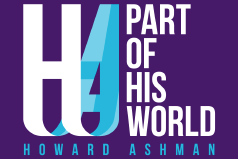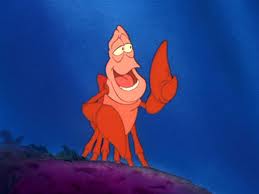John Musker Question Countdown # 6
Question #6
The other day, I was watching Mermaid with commentaries on, and whenever a certain scene came up, John would say, "Oh, Howard wrote that," which surprised Alan Menken. So my question is how much of The Little Mermaid, story-wise and script-wise, did Howard contribute and did his strong sense of storytelling create a more relatable, emotional, and personal movie?
I have detailed in earlier answers some of the areas of “Little Mermaid” that Howard put his stamp on. The Joan Collins cattiness of Ursula, Sebastian being Jamaican and singing calypso and reggae, the importance of Ariel being in love with all things human and not just a human prince, etc.
There were additional things that reflected Howard’s POV. Howard liked the idea (as did we) of the prince being “unprincely” and kind of a regular guy. Howard called him a “Jimmy Stewart, Henry Fonda, aw shucks, flannel shirt, kinda guy.” Howard was also big on this being a father–daughter story, and emphasizing the relatability of the independent teenager struggling with an over protective parent.
But there was a crucial screening that we had in the middle of production which led Howard to get more overtly involved in the script, culminating with him not just giving notes, but actually rewriting certain key scenes. It was a screening for Michael Eisner that we had up in the old animation building, in 3E-12, which was Walt’s “sweatbox”, the screening room nearest Walt’s old office. Ron Clements remembers this screening better than I, and when Sarah gets him to post on this blog, he’ll straighten out all my foggy recollections.
But in the meantime this is what I seem to remember. Michael rarely saw what we were doing. Jeffrey Katzenberg saw things about weekly. But he was duty bound to show Michael what we were up to at a few strategic spots along the way, and this was the main one. I believe this was in September of 1988 for reasons I’ll explain in a moment. There was some animation in our “story reels” -- almost none of it in color. We showed Michael this assemblage of storyboards and animation, the entire film in very, very rough form. Its temp music track was a solo piano with Alan Menken sawing way, ‘silent movie style’. The presentation itself was like any presentation back in the pre-digital age. It was “dual system”. That is, it had separate reels for picture (film all spliced together) and the soundtrack (35mm mag tape joined together by leader.) Story reels are always hard for people from the live action world to interpret. You really have to fill in the blanks. Jeffrey initially had a very rough time with them (even at this time it was difficult) but to his credit he learned how to “read” them. Michael never saw them enough to develop this skill. This was technically a very bumpy screening. The picture and sound reels had to be interlocked mechanically for the movie to be “in synch”. And our reels broke. When restarted they were out of synch. Michael was bewildered. We were mortified. Jeffrey was squirming. They don’t call these screening rooms “sweatboxes” for nothing. Michael was trying to follow what the story was but he was upset. He thought we had story problems that should have been fixed in the script before we ever got to this point. He groused while they were scrambling in the booth to restore synch. We were jumping out of our shoes. I don’t believe Howard was at this screening but I’m not sure. We managed to get though it. Michael had some smaller issues. There was something about the exposition involving Ursula he had a problem with. But his most critical note was this: through the front half of the movie Sebastian was dead set against Ariel’s involvement with the human world, and then after she became human he seemed to be her ally in securing the prince. Michael didn’t see any clear moment showing how or why the crab shifted his allegiance. In the usual “black and white” “all or nothing” notes style that both Michael and Jeffrey shared, Michael said, “If you don’t solve that, you don’t have a movie.” He left.
Jeffrey stood up in the light of the screen at the front of the room and we sat in the first row before him. He had on his starched white shirt and crisply knotted tie and I don’t know if there was sweat trickling under it or not, but he was direct. “Well guys, you got a boss (me) and I got a boss and we’re gonna roll up our sleeves and address his notes.”
That was no easy matter. We were in the thick of production, each day had meetings back to back. Much of the movie was being animated, recorded, laid out, etc. Although overstated, we thought Michael had a point. You might miss why Sebastian switched sides. We discussed these issues with Howard and came up with some thoughts as to how to proceed. As I recall, we had to meet with Jeffrey in the evening at his Malibu beach house to present them. My wife Gale was very pregnant with our third child at that time, and was due any minute. I drove to Malibu unsure whether I could find Jeffrey’s house, and whether I might miss my child’s birth (I didn’t. My daughter Julia arrived a little late, Sept.26th, 1988.) I managed to turn the wrong way on Sunset off the 405 freeway and in my daze drove some way before I realized I was headed east, away from Malibu, and the notoriously impatient Jeffrey and his beach pad. Ai yi yi!! I finally arrived, Ron thinking I must have been at the hospital with my wife, greeting my new daughter. Howard was there at Jeffrey’s house as well, as I recall, and we hashed out our ideas for rewrites, which Jeffrey seemed to go along with.
How would we have time to write them, though, while trying to keep the production machine fed? A definite problem. Howard spoke up and volunteered to do them. Ron and I agreed and off Howard went.
So it was, that Ursula’s first scene was rewritten by Howard. The info in it all existed before, but Howard laid in the appearance jokes about her “wasting away to practically nothing.” As I recall he tried to get the idea over more tersely about her motivation and enmity toward King Triton.
More importantly, Howard addressed the Sebastian issue. He wrote Sebastian’s soliloquy on the beach after they wash up from Ariel’s tranformation into human by Ursula. And here it is:
SEBASTIAN
Just look at her! On legs! On human legs!! Mt nerves are shot!! This is a catastrophe!
What would her father say? I’ll tell you what her father’d say! He’d say he’s gonna kill himself a crab dat’s what her father’d say!! I’m gonna march meself straight home right now and tell him just like I should have done the minute…(notices Ariel shaking her head,“No!!”)…and DON’T you shake your head at me, young lady! Maybe dere’s still time…if we could get dat witch to give you back your voice, you could go home with all the normal fish and just be… just be…( Sees Ariel’s desperately sad face)…just be…miserable for de rest of your life.
(resigned) All right, all right, I’ll try to help you find dat prince. Boy!! What a soft shell I’m turning out to be…”
My memory bank says we may have done a little editing to Howard’s speech. But it is essentially his. He was brave enough to write a monologue, something Howard as a stage dramatist was comfortable with, but we who have a fear of too much dialogue in a visual medium, would have been nervous about. He made Sebastian’s change of heart plausible, entertaining, warm, relatable, in character, and like all the best writing, surprising but also exactly right.
Howard also rewrote Sebastian’s scene in the bedroom where Ariel is going to sleep. Our pre-Howard version of this scene is the beginning and end of this where he mostly stewed about his mistreatment and finally realized Ariel was contentedly asleep and had heard none of it. Howard added the active plan of “batting your eyes like dis” and “pucker up your lips like dis.” As I recall, Howard also had a line about dropping her handkerchief that we, or story board artist Ed Gombert, who boarded this scene and many of Sebastian’s key moments, trimmed out before animation. Howard’s goal was to make it more explicit that the crab was actively trying to help Ariel, that he was clearly in support of what was going on, and to do it with comedy.
The other primary scene that Howard wrote was the final scene where Sebastian and Triton watch the forlorn Ariel in her archetypal Mermaid on the rock pose stare at the woozy prince on shore, seemingly having lost him forever with her back in mermaid form and no longer human.
In earlier versions of the script and story reels, Ariel had become human again with a kiss. It was Peter Schneider, Jeffrey’s volatile lieutenant in charge of animation day to day who had the idea that Triton should give Ariel her legs back. We often dealt with ideas from the executive ranks that made us scratch our heads, but this was the best idea Peter ever proposed to us. It seems obvious now but we hadn’t seen it. Still, even when we embraced this idea, we had Triton say, “That human saved my life…” before deciding to change Ariel’s legs. Much of the scene was played in pantomime.
Howard had problems with both of those things. As a stage dramatist it seemed crazy to him (and not dramatic) to have much of what was happening conveyed only in looks: “Guys, I can’t believe you’ve got these characters who have gone through all this, and they have nothing to say to each other!!” He also thought Triton’s line was all wrong. “That line makes sense if you’re doing a story about prejudice,” Howard stated flatly. “But that’s not the story you’re telling! You’re telling the story of a rebellious teen who needs independence and an overprotective father who loves her and has to realize he’s got to let go!”
So Howard rewrote that dialogue between the crab and Triton and it is one of my favorite scenes in the movie. Triton’s new point of view is made explicit: “She really does love him, doesn’t she, Sebastian?” Once again, with comedy and irony, Howard makes clear where Sebastian’s heart is: “It’s like I always say, your majesty, children got to be free to lead their own lives…” After Triton’s bemused reaction at Sebastian’s new point of view, he turns sadly back to his daughter, “Then I guess there’s just one problem left…” Sebastian uncertain where he’s going with this: “And what’s dat, your majesty?” Triton gets a wistful look as he gathers himself. “How much I’m going to miss her…” And he uses his trident to turn her human, finally giving her the freedom to follow her dreams, even at the cost of her leaving him and her home forever.
I love what Howard did with this scene, making Triton’s decision dramatic, but doing it in between the lines. The scene is succinct. The theme of the film is encapsulated, but enclosed in wit, warmth, humor, and real, relatable emotion. And for that, and for so much more, I will be forever grateful.
Thank you, Howard.



